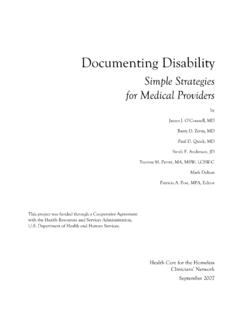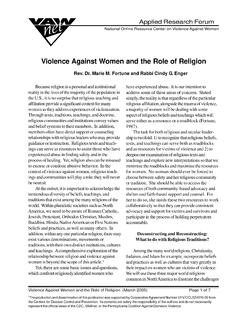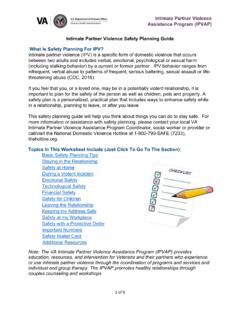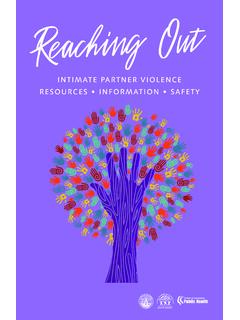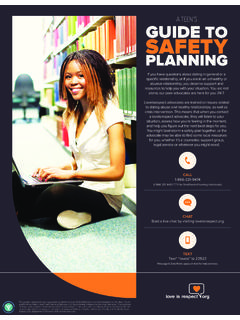Transcription of Medical Summary Report Interview Guide and Template
1 Medical Summary Report Interview Guide and Te m p l a t e The Medical Summary Report (MSR) Interview Guide provides sample questions and guidance for gathering information necessary to the SSI/SSDI disability determination process. We do not expect you to ask all the questions in each section. The questions are intended to help you gather all the information you will need to write a Medical Summary Report . For example, if the individual has not been in military service, there is no need to include a military history section. Likewise, if the individual has no legal issues, do not include a legal history section. Using this guidance, SOAR-trained providers are able to gather a thorough history in a respectful manner, which in turn helps the Disability Determination Services (DDS) understand the duration of a person s impairment and the effect of their illness(es) on work ability and functioning.
2 The MSR Template may be used to compile information in the form of a narrative letter to SSA/DDS as part of the SOAR process. The Template has eight main sections, covering the types of information that DDS needs to make a decision. Use the headings provided in the Template to organize your MSR. Using Trauma Informed Interviewing to Reduce Implicit Bias The SAMSHA SOAR TA Center is working to reduce the influence of implicit bias and encourage diversity, equity, and inclusion (DEI) during the information gathering process for the Medical Summary Report . This guidance asks you to consider how a potential applicant s racial, ethnic, and cultural backgrounds may impact their perceptions regarding their disabilities, diagnoses, symptoms, and treatment and to be mindful of how this may impact your opinions/feelings/attitudes towards the client s functioning.
3 The interviewing process can uncover very sensitive topics such as past and current trauma, thus it is important to be sensitive to influences that affect a person s willingness and ability to provide information. How questions are asked during this process can be critical to obtaining the appropriate information. The overarching question you should be asking yourself is: Does asking this information help provide insight into the applicant s functioning? Is the question being asked in a way that conveys a sense of care and non-judgement? SSI/SSDI Outreach, Access and Recovery (SOAR) Technical Assistance Center March 26, 2021 Information Gathering Best Practices for DEI Considerations Communication: Cultural contexts as well as culture-specific verbal and nonverbal aspects ( gestures, body language, personal space, etc.)
4 Of communication should be considered during client interaction. It may also be helpful for SOAR Case Workers to increases knowledge of societal figures of speech and phrases that denote negative connotations of various DEI groups. Values: SOAR case workers can incorporate culturally diverse client values and beliefs into the Interview process. Cultural beliefs such as involving family in the process or spirituality practices may help to form a more effective relationship with the client. Self-Awareness: SOAR case workers should be sensitive to their own inherent racial or cultural identity and privilege, ethnocentrism, prejudice, and stereotypes when interacting with diverse populations.
5 They are constantly aware of how their own attitudes and beliefs impact their perception of the client, the client s presenting problem, and the counseling relationship of rapport. Flexibility: Sometimes it may be necessary for SOAR case workers to acknowledge the limitations of their own cultural competency and expertise when dealing with culturally diverse clients. In some cases, they may be advised to seek cultural-specific guidance when working with a client. SOAR Tip: Interviewers who feel uncomfortable or ill-equipped to explore certain topics should not do so. Instead, they should seek assistance from someone who is more clinically skilled and more able to assess responses, to ensure that the person is safe from self-harm and/or emotional distress when the Interview ends.
6 SSI/SSDI Outreach, Access and Recovery (SOAR) Technical Assistance Center March 26, 2021 Medical Summary Report (MSR) Interview Guide Section I: Introduction This section should provide a description that creates a mental picture to help a DDS examiner see the individual, since it is unlikely that the DDS examiner will ever meet the applicant. The introduction to the MSR will also include all the applicant s physical and mental health diagnoses, as well as an overview of the case worker s and agency s involvement with the applicant. A. Physical Assessment Provide an assessment of the applicant s appearance, functioning and your interactions with the applicant, include information about the applicant s: o Height and weight o Clothing, hygiene, grooming, glasses, assistive devices Information to Consider Avoid information regarding the applicant s race, sexual orientation, or religion unless these demographics are related to traumatic experiences and/or discriminatory practices that impact their physical and/or mental health and contributes to the severity of their symptoms and current ability to function.
7 (*Note: SSA does not collect information regarding those demographics.) B. Observations that illustrate the applicant s symptoms or functioning Speech problems or pace; ability to remain engaged or maintain face to face contact Movements: Unusual movements of mouth/face; tremors in hands/legs; pace (fast/slow) Demeanor: Agitation? Attitude? Alert? Focused or needing re-direction in conversation? Section II. Personal History A. Current and Past Living Situations; Homelessness History It is important to know where the person is living for several reasons, including documenting homelessness or risk of homelessness. This information might also be linked to functioning since the ability to function effectively often is affected by housing status.
8 Sample questions: Where do you live or stay? Who are your household members? Where did you live prior to where you are now? Have you ever lived independently? What was that like for you? Why did you leave that situation? Were there times you were homeless, after leaving one place and before finding another? For each living situation: How did it go living there? Were there supports in place to help maintain the housing? What made you decide to move? SSI/SSDI Outreach, Access and Recovery (SOAR) Technical Assistance Center March 26, 2021 B. Family Assessment This section should illustrate what it was like growing up including a history of interpersonal relationships with family members and/or caregivers.
9 Information gathered should focus on how the person s family background relates to his or her symptoms and functioning. Sample topics/questions: Place of birth; household members, family structure, social relationships, etc. Tell me what it was like when you were growing up. When growing up who lived with you and was involved in your life this can lead the question to open the conversation to understanding who were involved in this person s life. Is there history of behavioral/emotional dysfunction as a child or young adult? Was the adult s general childhood history nurturing and satisfying or unhappy? How old were you when you left home? Why did you leave? Do you have contact with your family?
10 Information to Consider Avoid listing personal names of family members ( , children, ex-spouse/partner, parents, etc.) who have not given permission for providing collateral information. C. Marital/Intimate Relationships This section further speaks to assessment of how a person manages their marital or intimate relationships and can highlight impairments in social functioning ( Interact with others). Sample questions: Are you currently married or in a relationship? How long were you with _____? What happened when the relationships ended? Were you in an abusive relationship ( , emotional, physical, or economic abuse Do you feel now with your partner? Did the relationships include any violence/hitting/yelling/ emotional problems?)

